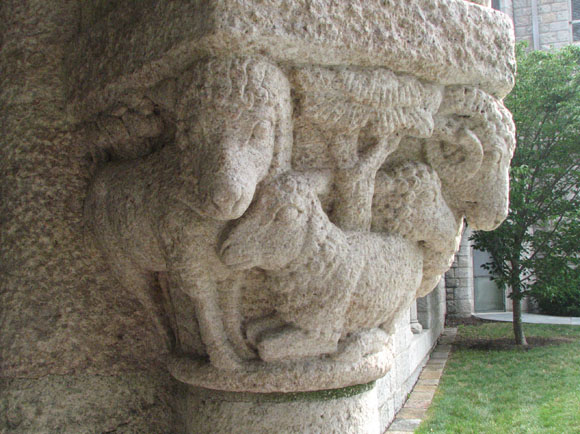September 18, 2008
Wilhelmina Geddes Apollo Article
The first speaker I heard at the AGG Conference in August was Dr. Nicola Gordon Bowe, who spoke about Wilhelmina Geddes. Dr. Bowe mentioned at the conference that she has an article coming out about Wilhelmina Geddes in a future issue of Apollo Magazine. This week, I was pleasantly surprised to find the article is online - A Window With Punch.
Definitely worth checking out as it's a long article with images. The story involves a bit of controversy as well. Seems the new vicar didn't like the 'experimental' new window and had it removed to a less prominent part of the church, using rather strong language in the bargain, even referring to the 'hideous' and 'repulsive' St. Christopher carrying the 'Mongolian Christ Child'. Yikes.
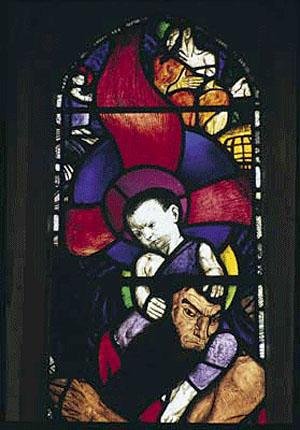
St. Christopher with Christ Child
Detail of window for All Saints Church, Laleham, Surrey , 1926
Photo: Peter Cormack
For more on Wilhelmina Geddes, we'll have to wait for Dr. Bowe's book on Wilhemlina Geddes to come out in 2009. Looking forward to it...
September 13, 2008
Open Studio - Judith Schaechter
August 2, 2008 pt.2 - In between going to the Glencairn Museum in the early morning and the AGG conference in the afternoon we (Dan Maher, Nancy Nicholson, and myself) picked up Judith Schaechter (gallery) at her home in Philadelphia and got a quick tour of her house and studio.
This is Nancy Nicholson, me and Judith in Judith's home studio looking at sections of her then in-progress and now installed MAD commission.
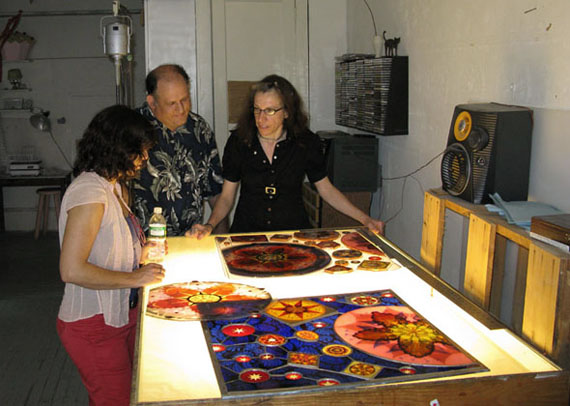
photo by Dan Maher
It was a very quick tour, no more than about 15 minutes, since we were running late. Still, lots of interesting stuff to see. And many pictures...
The House
a.k.a. - Stuffed Animals, Stained Glass and General Stuff for a Militant Ornamentalist
Judith lives in a Victorian era house in Philadelphia, with old stained glass windows of varying quality thoughout the house.
The front door panels are some of the nicer ones.
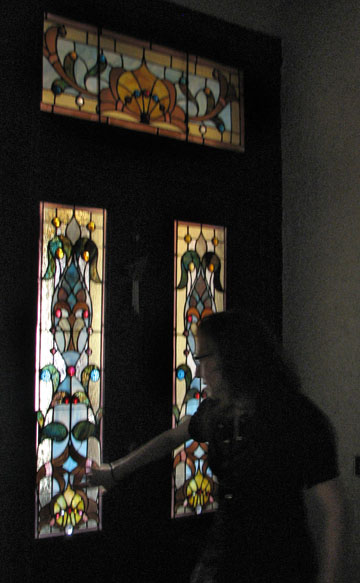
The jewels in the front doors are especially nice.
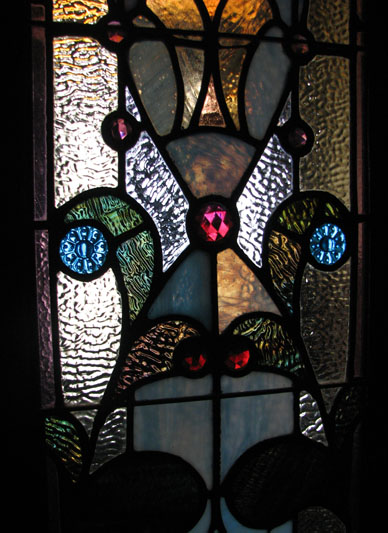
There are various stuffed and otherwise represented animals throughout the house. I missed getting a picture of the coyote in the front window and the pictures of the raccoon and the rats came out too fuzzy. I did get these shots.
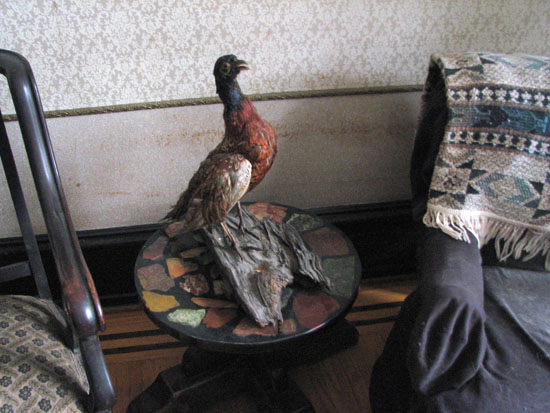
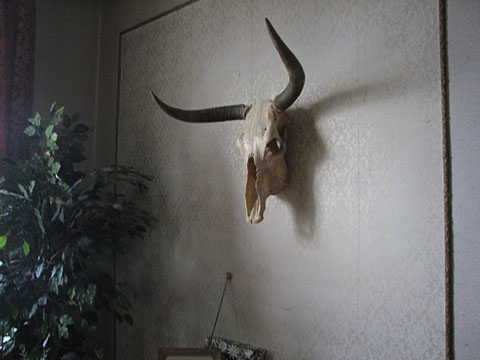
This fireplace came out a bit fuzzy as well, but it's such amazing tilework I had to show it anyway.
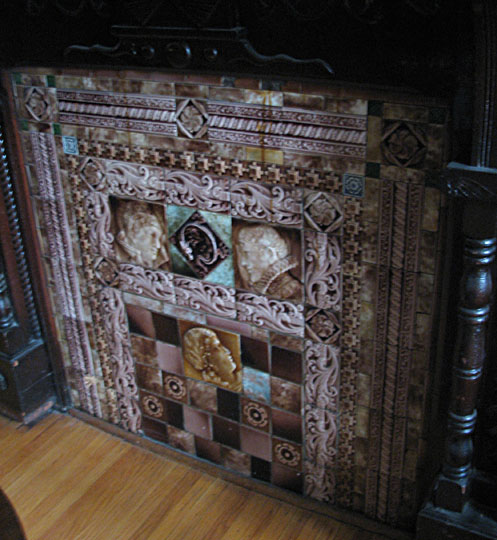
Even the staircase is elaborately ornate. Appropriate for someone who states her occupation as Militant Ornamentalist.
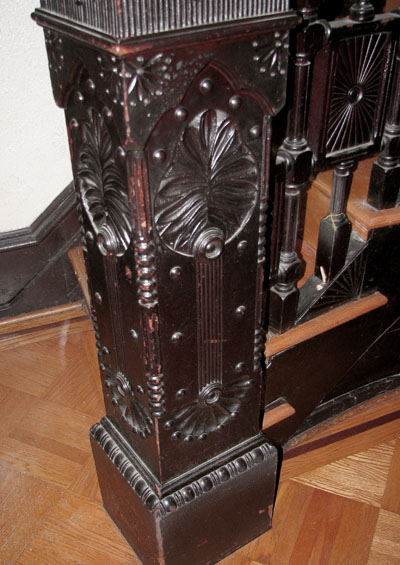
Another old window, in her bedroom, not as nice as the front door ones. It's a bold stained glass artist who puts yellow and purple together in a such a wide prominent border.
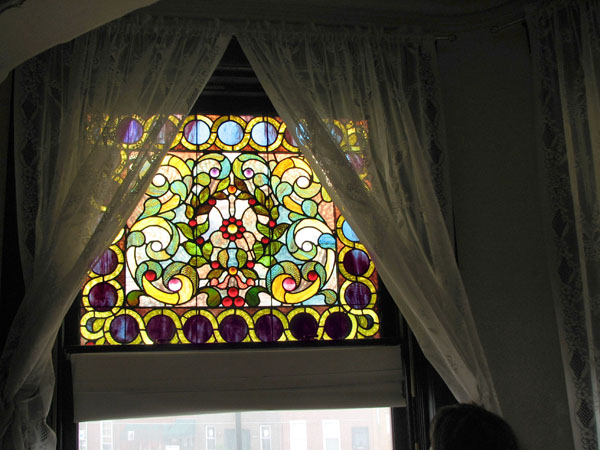
Judith's Studio
The puppets greet you on the way into the studio, though I never got the backstory.
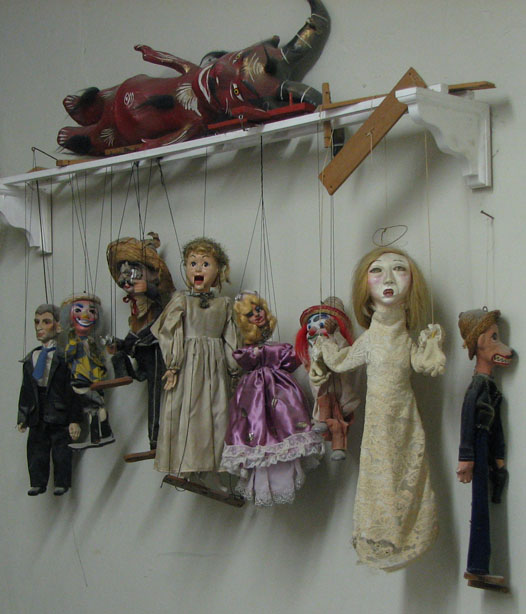
She keeps a remarkably clean and orderly studio.
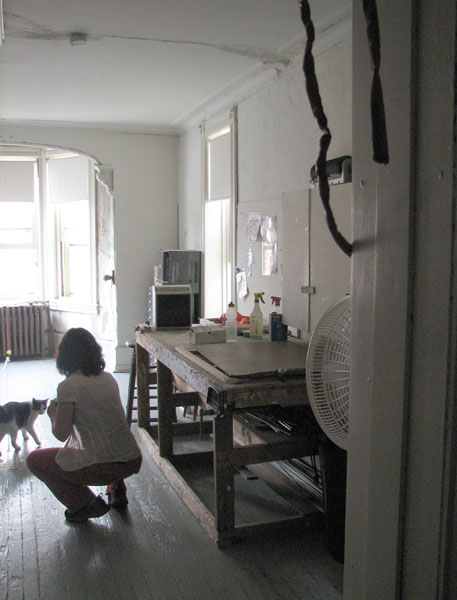
Another view showing the light table and glass racks
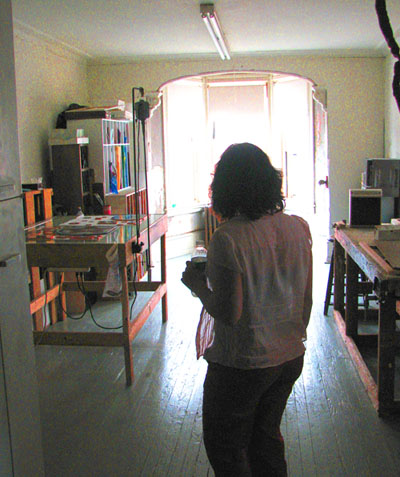
Judith showing off her bigtime hexacon soldering iron.
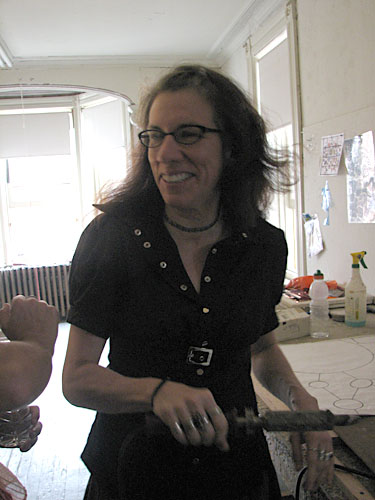
She has (I think) 5 cats.

The biggest work bench in the studio. The print on the wall seems to be an early sketch for the MAD commission and the floral artwork is also related to the MAD commission - more on that below. The photo in the upper right is of a distant relative of hers whom she mentions on her website, John Fletcher Hamlin.
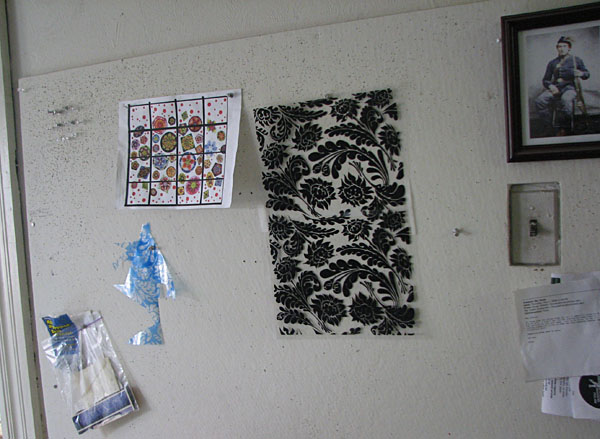
More stuff -
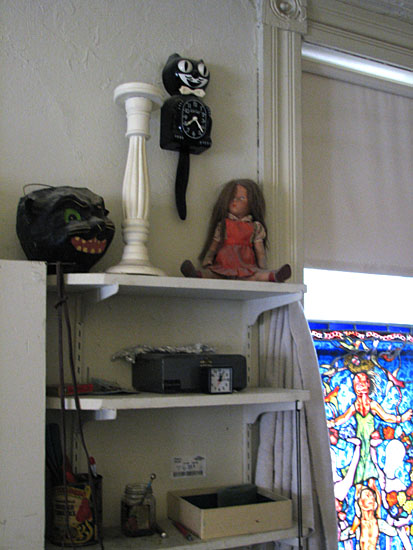
Studio Panels
This is called 'The Knot'. I told how nice it is to see her panels in natural light. She said she gets that a lot and that she is in no way opposed to having her work in natural light, but the market dictates.
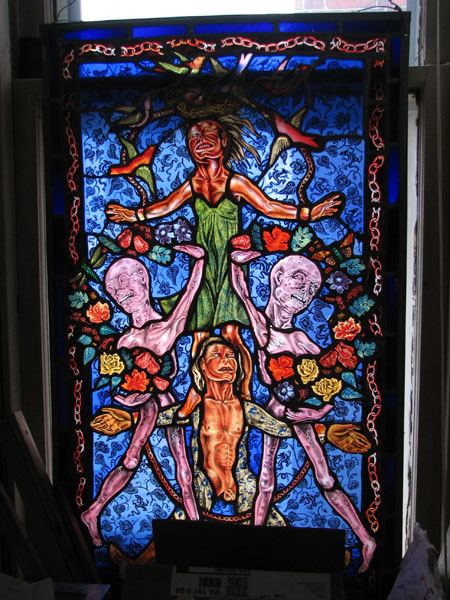
Detail with some reflected light
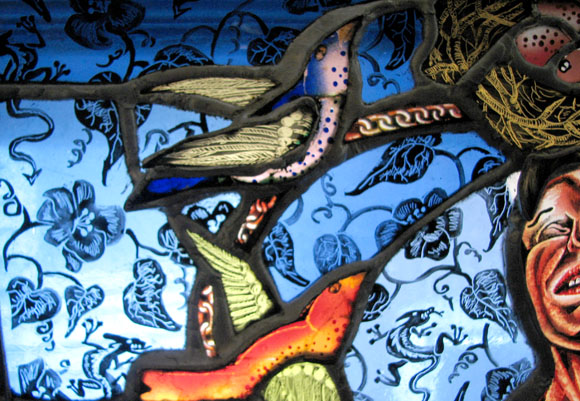
Detail showing some of the layering. It's also nice to see the details of the blue background, to see how wonderfully loose and scratchy the painting is.
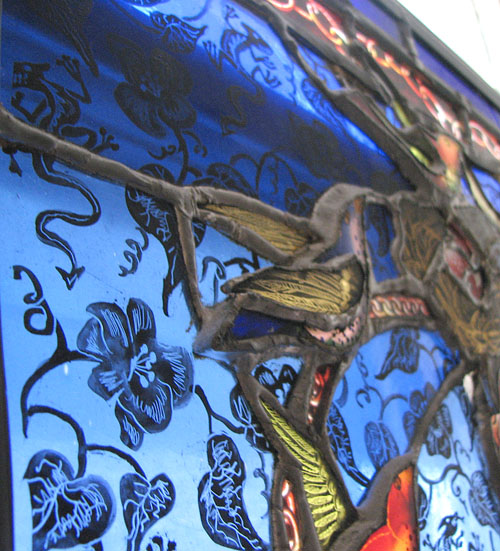
One more little panel with a favorite theme - car crashes.

The MAD Commission
That is, the commission for the Museum of Art & Design, formerly the American Craft Museum. They've revamped their building in NYC, and Judith was commissioned to do a permanent installation.
Again, the window is now installed - see the pictures of the installation.
The full panel.
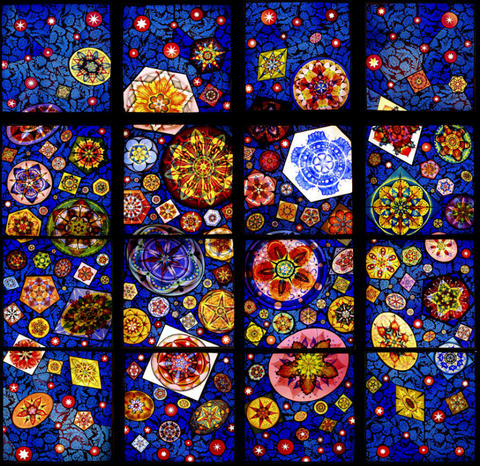
Again, the earlier sketch -
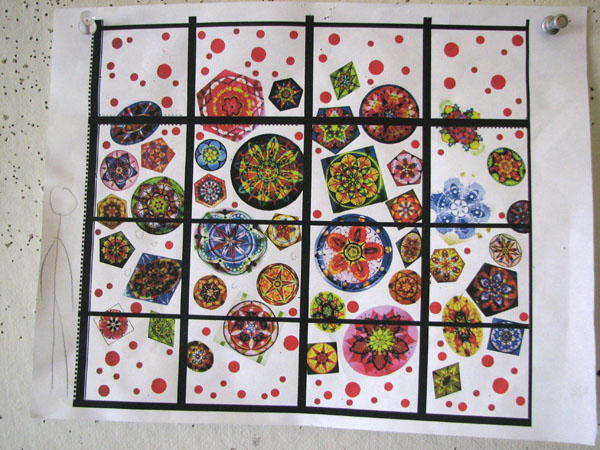
And this shows what that transparency hanging in the studio was used for - for tracing the diaper pattern in the background.
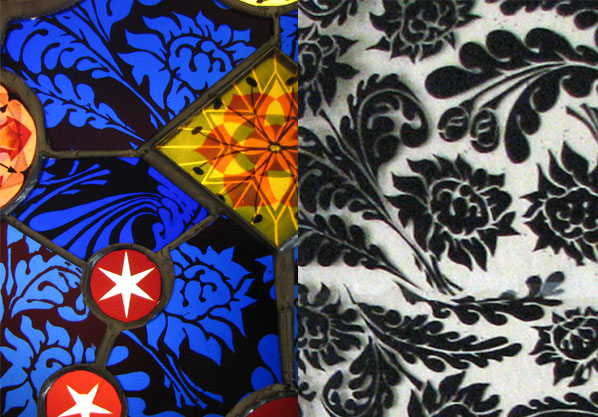
From a purely stained glass insider technical point of view, I always try to get a few shots in reflected light. To see how it was constructed, to see what is plated and what is not plated, to see what the solder line looks like.
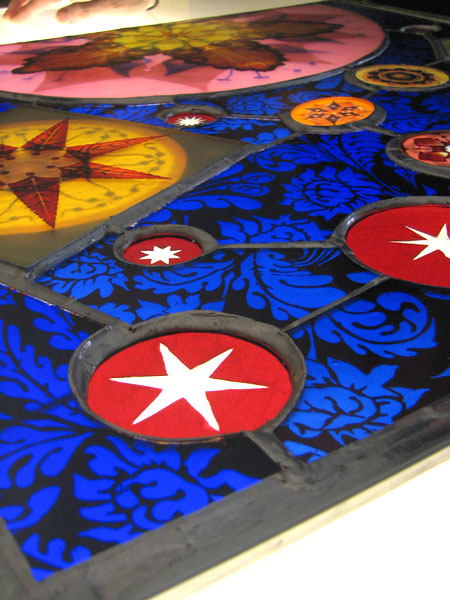
I'm not sure if these are pieces for another section, spare pieces, or rejects or what. But it is interesting to see them.
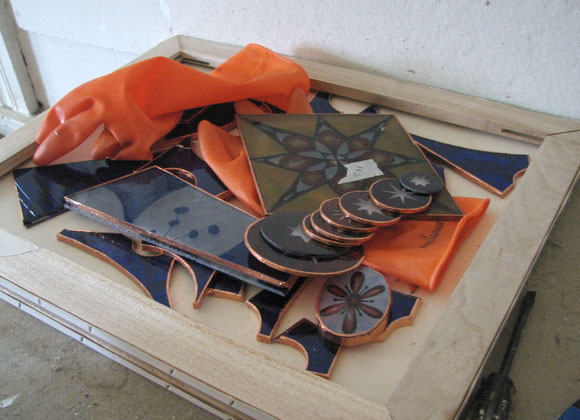
Pieces in place, and in process.
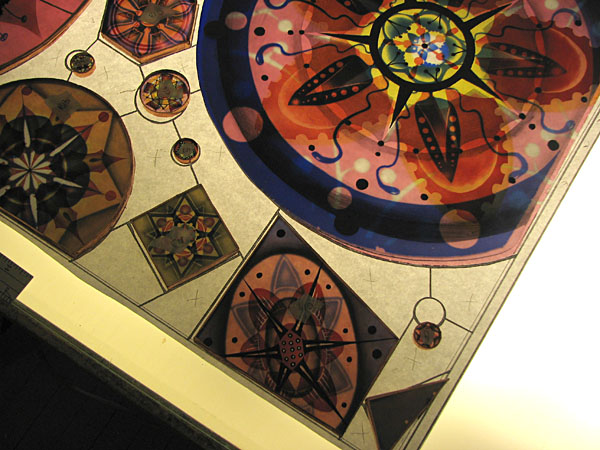
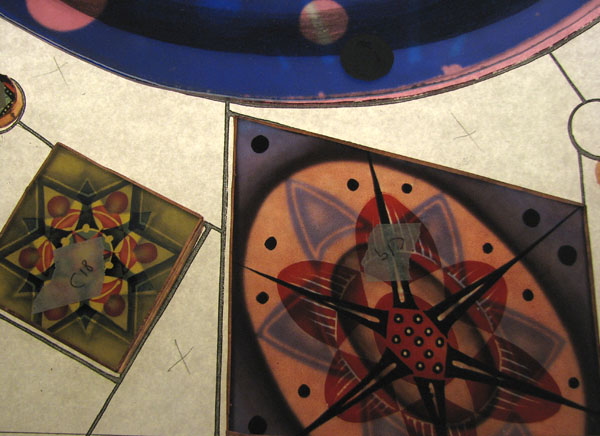
close-up of the finished panel - wonderful wonderful stuff.
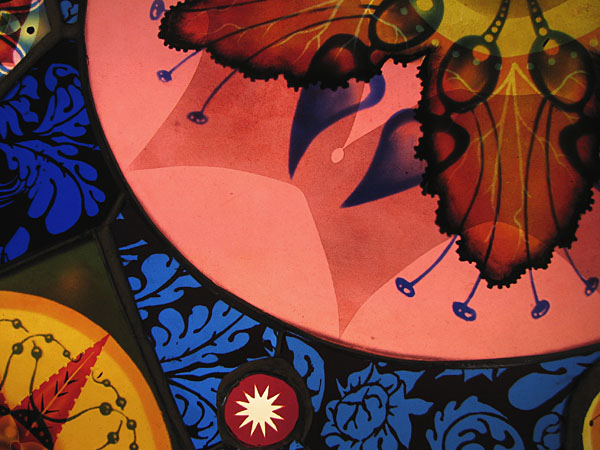
Thanks Judith for the tour and the preview of the MAD commission!
Can't wait to see the final work in place.
September 12, 2008
Arthur Ganson
Kinetic Sculpture by Arthur Ganson - Not at all about stained glass, but I remember this artist when he was just starting out in the Boston area some 25-30 years ago and doing his handmade gears from ordinary wire. He's come a long way and is making remarkable work. I only wish someone would bring this kind of inventiveness and thoughtfulness and humor, not to mention engineering skill, to architectural glass work.
A 15 minute demonstration recently posted by the TED people, from 2004 -
September 09, 2008
Glencairn Museum
August 2, 2008 pt. 1 - The whirlwind day at the AGG conference started with a trip to the Glencairn Museum in Bryn Athyn, PA. Ken Leap gave a kind of practice tour (practice for the official conference tour Monday) including showing some of the discoveries he's made about the glass and glassworkers of Bryn Athyn Cathedral.
Glencairn is most famous for its collection of medieval art, with this panel being perhaps the most famous of the medieval windows - Flight Into Egypt from St. Denis, France, circa 1145.
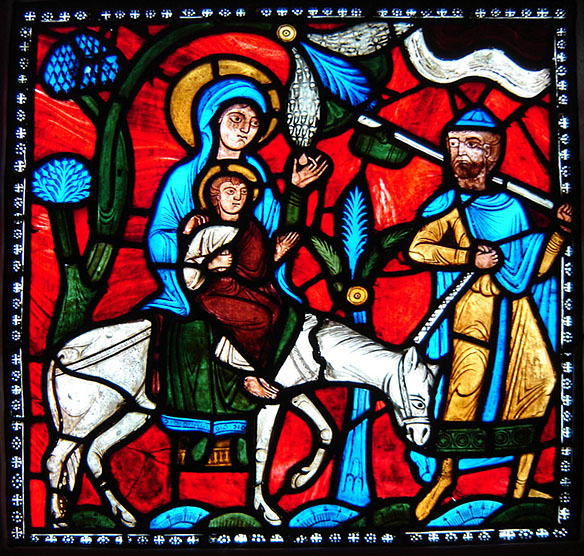
I'd been to the Glencairn Museum before, though it was 22 years ago. The Cathedral hasn't changed at all, but the Museum has changed a little. The Glencairn Museum is now marketed primarily as a museum of religious history. We focused on the stained glass, but there are also small galleries for Islamic, Ancient Roman, Egyptian, and Native America Art.
It is to my mind an amazing house museum, especially as a reflection of the arts and crafts ideals of the time.
Many photos, with a few comments, below the fold...
Bryn Athyn Cathedral
The Museum is just up the hill from The Bryn Athyn Cathedral. Alas, it was too early on a Saturday morning and we were not able to get into the Cathedral.
In terms of the history of the buildings go to the New Church History website, which has many fascinating articles related to both Glencairn and The Bryn Athyn Cathedral.
And what is the 'New Church'? Also known as the Church of the New Jerusalem, or the Swedenborgian Faith, it is based on the ideas, writings and books of Emmanual Swedenborg. You can get some sense of the uniquely American variant of Swedenborianism in this TIME article from 1938 - 'For Swedenborg'.
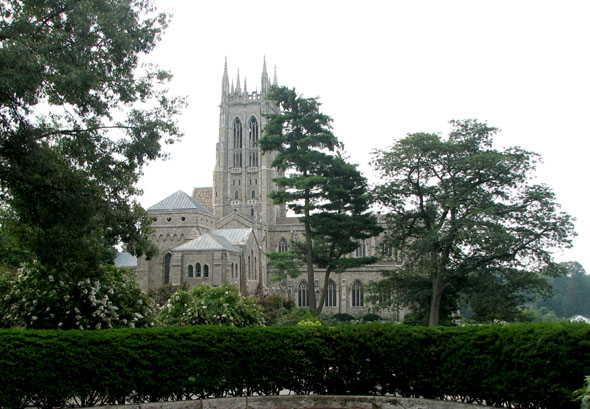
For lots more info on the Cathedral, check out Bryn Athyn Cathedral: The Building of a Church, with a section devoted specifically to the stained glass. Contains lots of info on the unique design/construction methods and the workshops that were created to build the Cathedral, then the house. The Cathedral was built first (1910's to 1920's), then Glencairn (late 1920's to 1939).
Exterior - Glencairn
Glencairn was the family residence of Raymond Pitcairn, his wife Mildred Pitcairn and their nine children, and remained the family residence until Mildred's death in 1979, when it was turned over to the New Church and became a museum in 1982. When I visited it had only been open as a museum for a few years. For more background on the museum, check out this article on the Glencairn website - 'A little castle' for his medieval artworks.
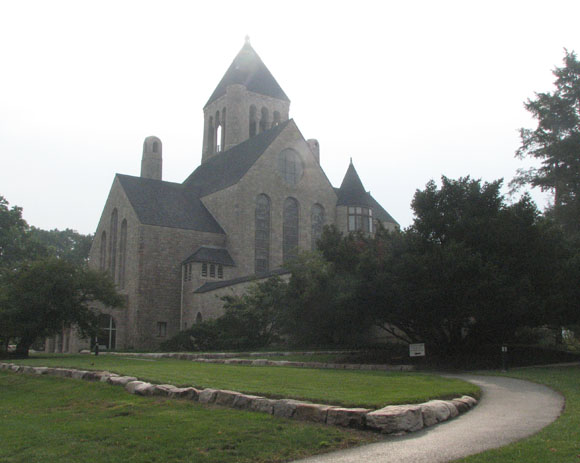
Great Hall
An amazing space.
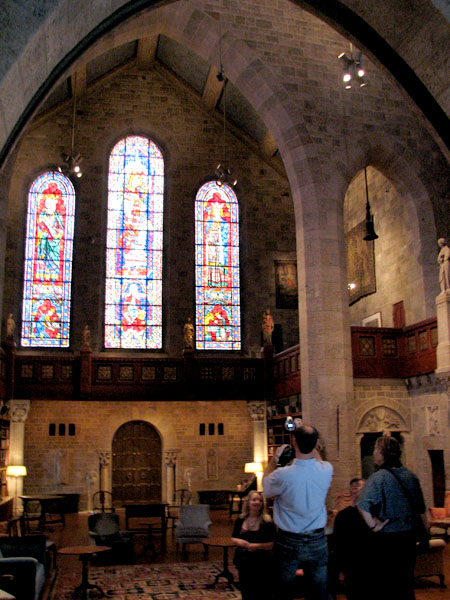
This only shows one of three large 3-lancet windows in this room. A few of the windows incorporate some medieval glass into them, but mostly these are windows made for the house. Some of these are based on specific designs of medieval glass, and some are newly designed.
This American window is obviously newly designed.
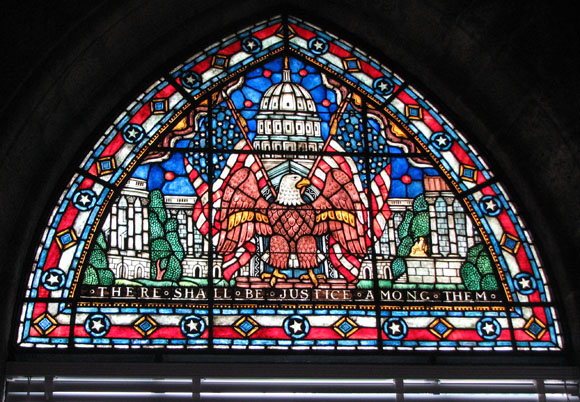
Swedenborgian Angels
Swedenborg was big on angels. The idea of the 'personal angel', popularized in movies like "It's a Wonderful Life" or "The Bishop's Wife", comes originally from Swedenborg. The Cathedral windows have dozens of angels in them, as can be seen at the webpage having to do with The Windows and Their Representations , which describes the scenes depicted in the windows at Bryn Athyn Cathedral - the word 'angel' is used 49 times in describing the iconography of the windows.
The house has a few as well -this one in the great hall, way up high.
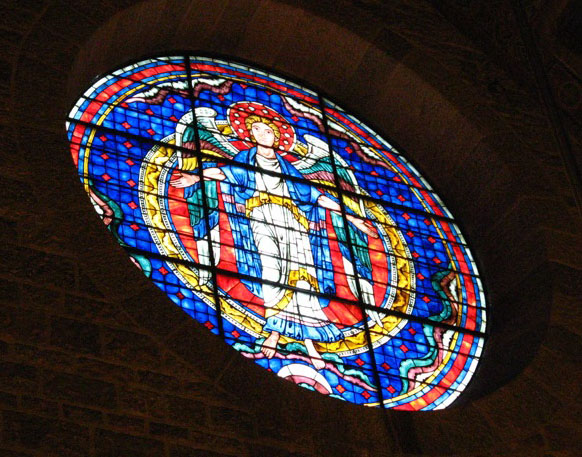
Another on an upper floor
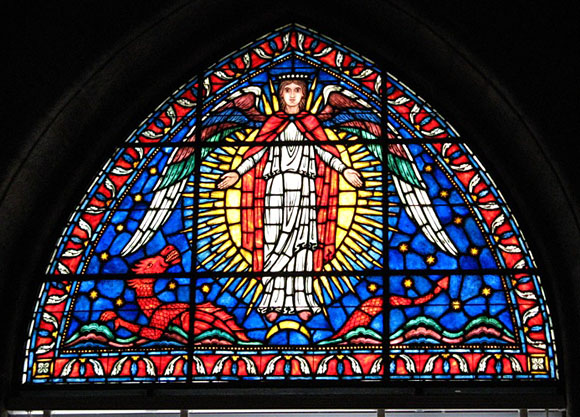
Flickrset for Glencairn Museum by Basta-Cosi
This one is a mosaic, which we didn't see on the tour but I found it on a flickr page from poodlerat
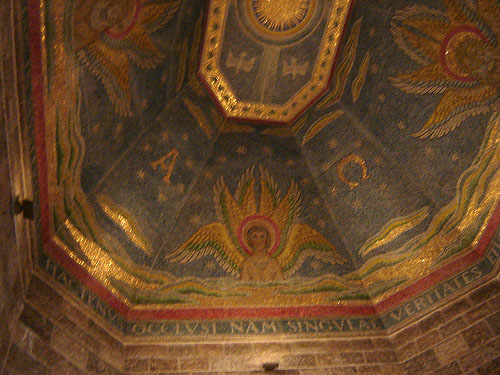
Arts & Crafts features
There is a distinctly Arts and Crafts feel to the house. Arts & Crafts with a preference toward the medieval, due to the amount of collected and incorporated medieval art.
Entrance Doors
Wonderful organic shapes and use of bullseyes.
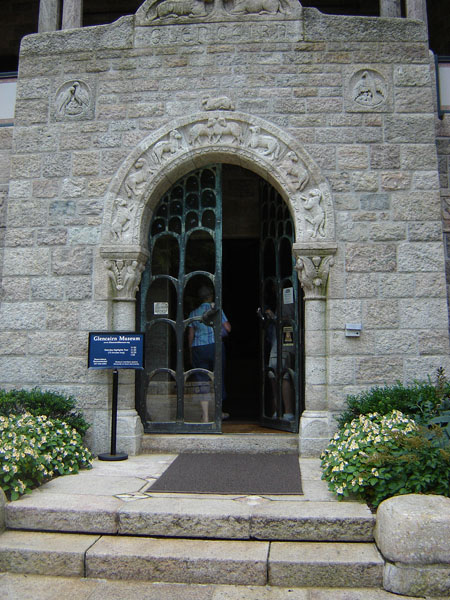
Entrance door from the inside.
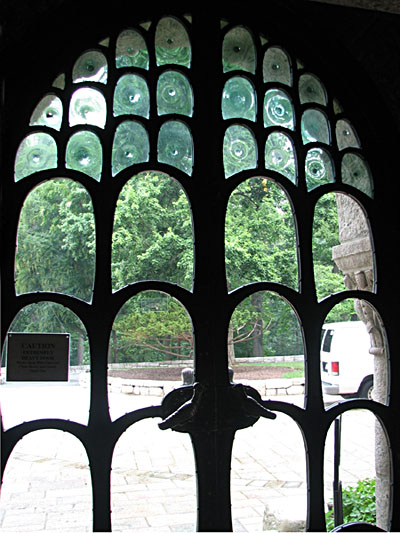
Interior Doors
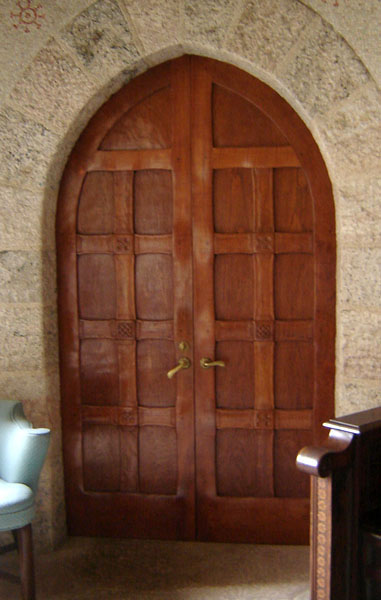
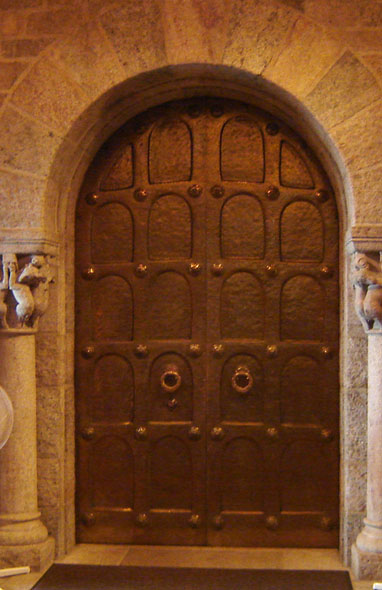
Even a back hallway can feature incredibly intricate work. The walls here are all done in mosaic.
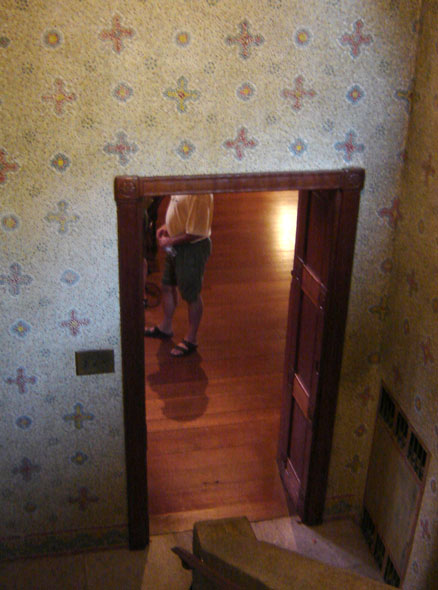
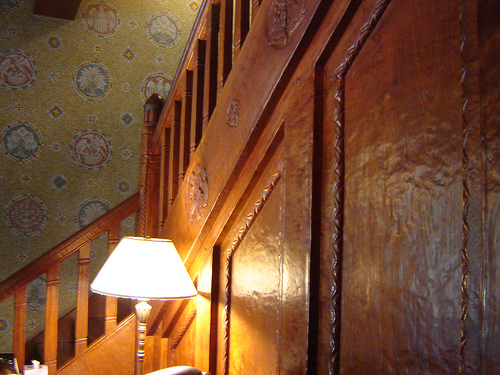
All the wood surfaces have this highly polished but undulating quality to them.
Also note the background wall, again mosaic.
Light Fixtures
Laborer Lamp - a tribute to the workers. Glencairn kept them employed throughout the depression years of the 1930's.
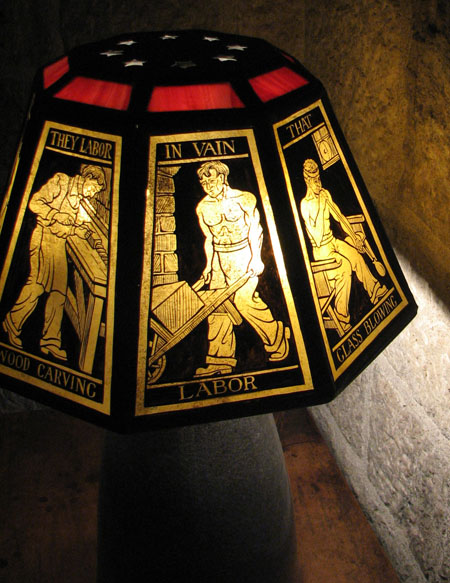
Bullseye Lantern
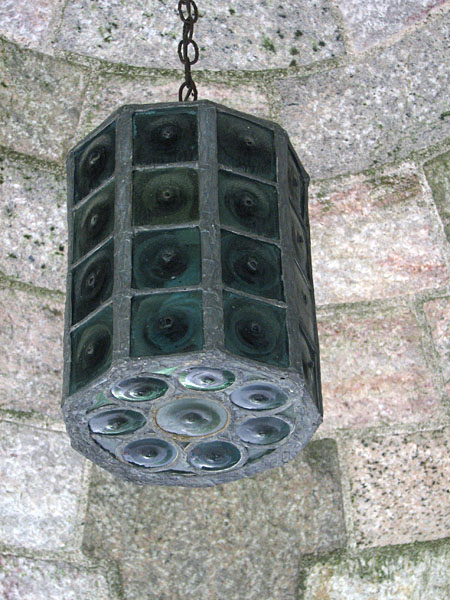
Medieval Stained Glass
As for the medieval glass, Raymond Pitcairn collected medieval art as reference for the artists creating Bryn Athyn Cathedral. You can still get a copy of the book Radiance and Reflection, which is about the medieval art in the Pitcairn collection.
This is another of the 5 panels from St. Denis
March of the Christian Army, St. Denis, 1150
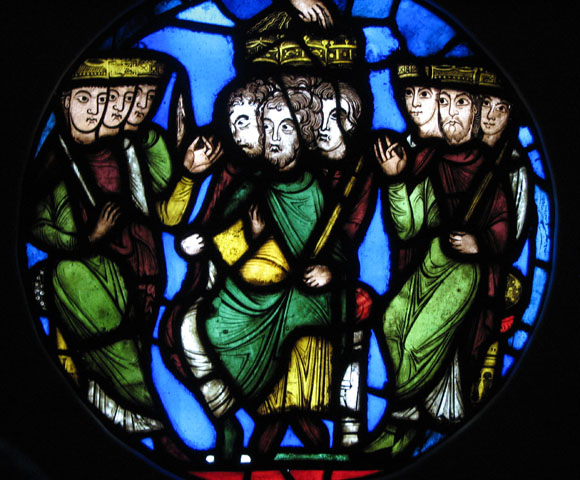
a detail
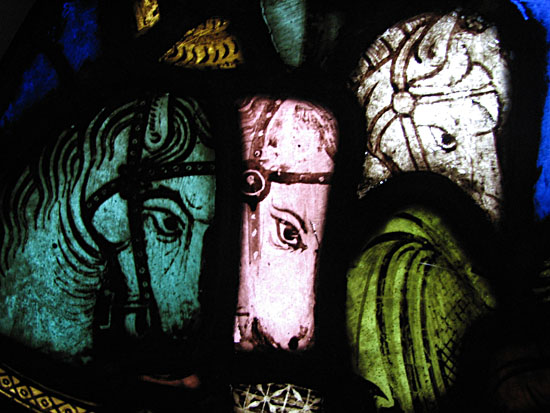
Most of the medieval glass is from the 12th-13th centuries.
and some of the content can be a bit grim. like this -
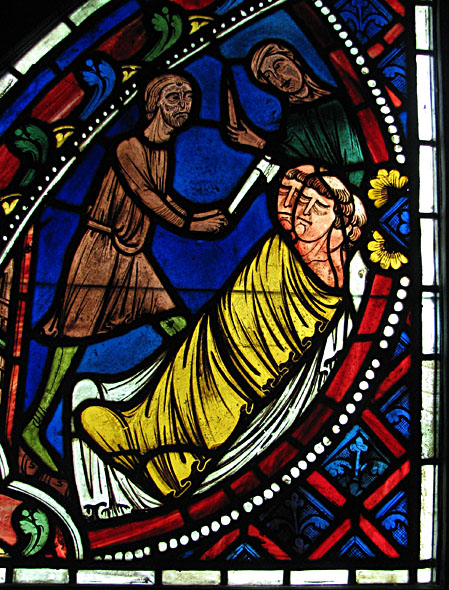
and this -
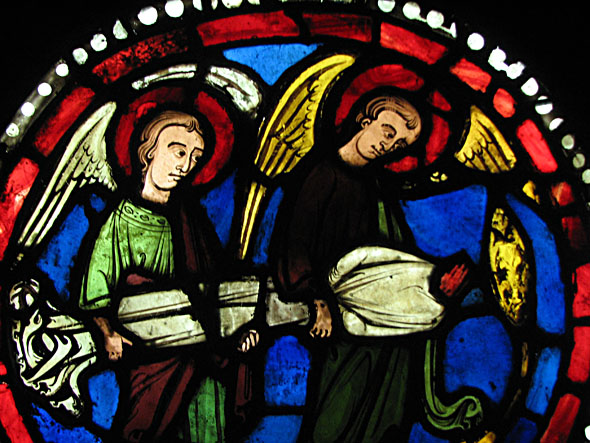
and this
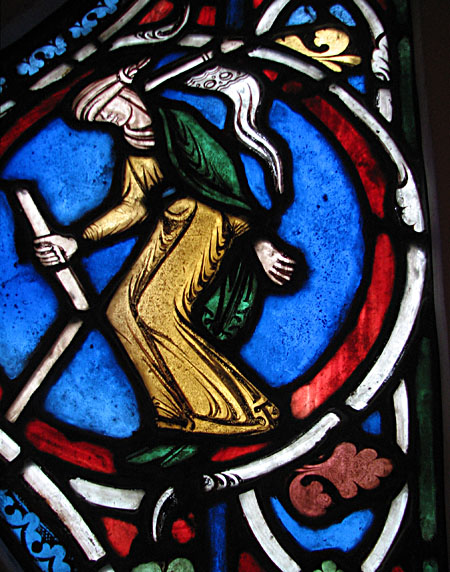
Note that the new glass made for the house presents a quite mild and gentle form of Christianity, same thing with the Cathedral. I know they even shied away from cruicifixion scenes. Again, Swedenborg focused more on angels than martyrs.
There are a few pieces that are later Medieval or early Renaissance. In these, there is a more tonal painting style compared to the earlier work.
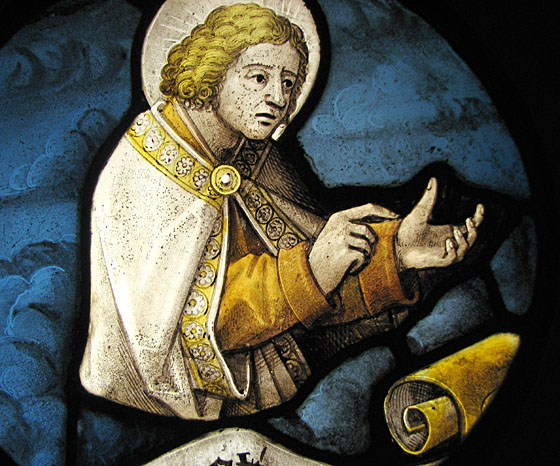
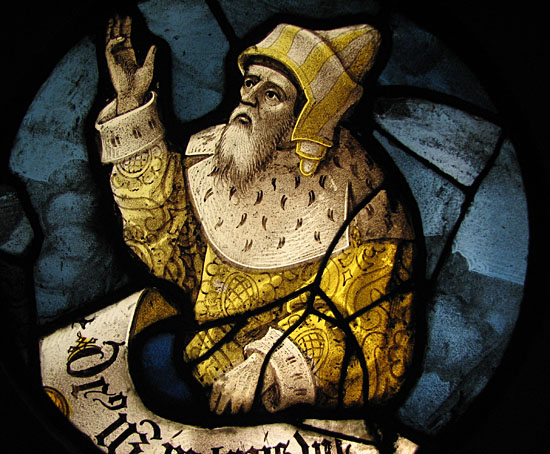
Sheet Glass of the Bryn Athyn Workshops
Unusually, the stained glass artisans of Bryn Athyn made their own sheet glass on site. Ken Leap has been researching this and did a display of what he's found. Ken also made a video showing the basement of the Cathedral where boxes and boxes of this glass are still stored.
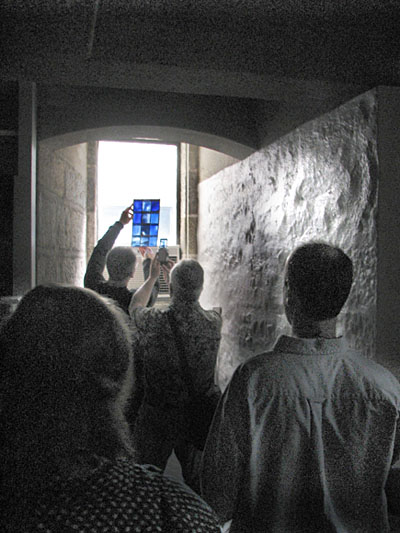
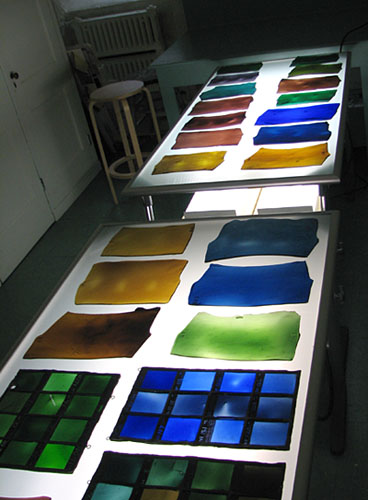
The sheets are all quite small. These were made using the 'muff glass' process, also called the broad sheet. The process is similar to the cylinder process, where a cylinder is blown, then cooled, split while cool and flattened while being reheated. In the broad sheet process, the cylinder is smaller and is split and flattened while the glass is still hot. Better suited for a small workshop. Still, not something you see anyone doing these days.
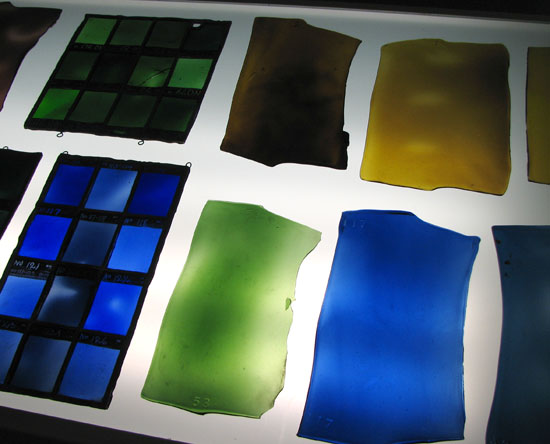
This is a sample set painted with sheet numbers and glazed together.
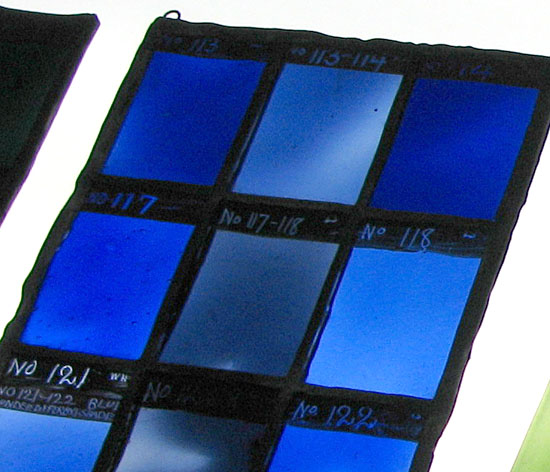
The glass numbers were stamped into the sheets while still hot.
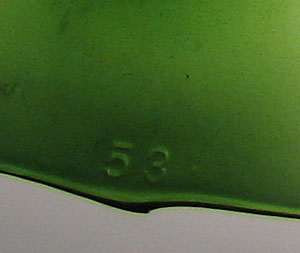
There is an online photo gallery called Glassmaking in Bryn Athyn, that shows pictures of the designers and glassworkers. It even has a schematic layout of the hot shop. Highly recommended.
There is one more surprising feature on the newchurch website - a diary on the creation of a stained glass window by Lawrence Saint. In the sectionon the Methusalah Book - the entire book is scanned and transcribed. The window is a recreation of a window at Canterbury Catherdral in England. Most of the diary seems to deal with glass painting techniques and experiments, very esoteric stuff. For hard core stained glass paint geeks only.
Methuselah Window
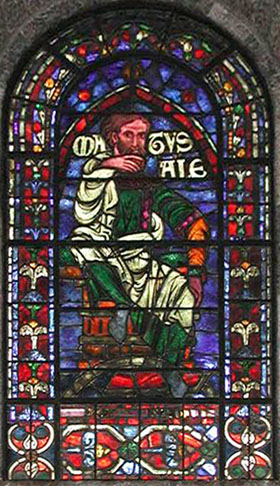
Capitols in the Courtyard
And finally, as we were leaving, there was this lovely courtyard, like a mini-cloister.
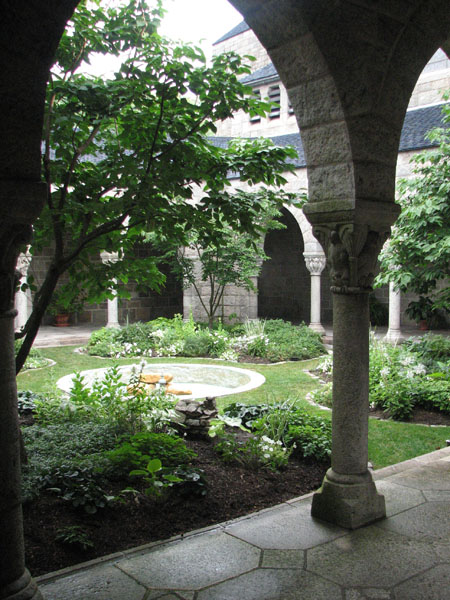
What struck my eye were the sweet capitol designs.
Birds mostly inside the courtyard and lambs on the outside.
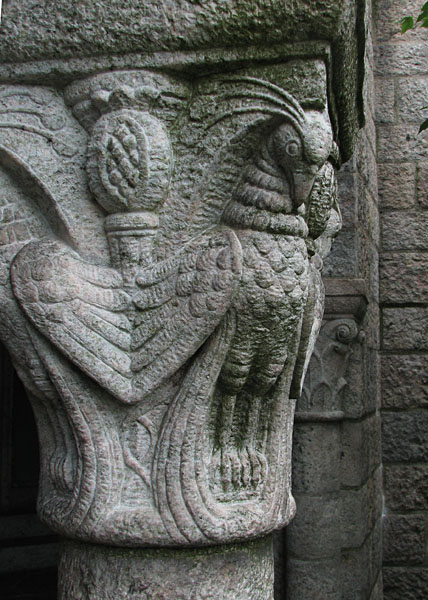
A peacock
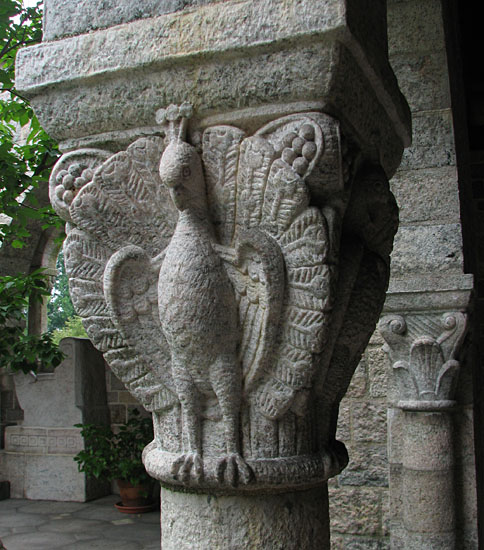
Nancy, of course, spots the pigeons.
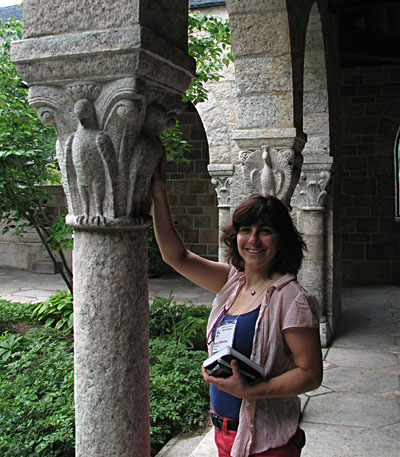
Lots of Lambs as well, which we were told represent the idea of family.
